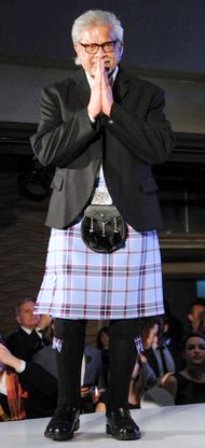Arun Gandhi

Arun Gandhi remembers the first time he wore a kilt.
“It was at the From Scotland with Love fashion show in Manhattan in 2012,” recalls the spiritual leader by phone from his home in upstate New York. “My good friend Victor Spence from Edinburgh was there promoting his World Peace Tartan initiative, and he put me in a kilt and put me up on the catwalk like some sort of celebrity.”
It was also the last time that the grandson of Mahatma Gandhi wore the traditional Scottish wrap.
“Victor wouldn’t let me keep it,” laughs the 81 year-old. “I believe it was the only one he had at the time, so he couldn’t let it go. He did give me the scarf, however, and I wear that with great pride.”
Gandhi is one of numerous notable recipients of the World Peace Tartan scarf, a list that includes eight Nobel Peace Laureates, the Dalai Lama, the Archbishop of Canterbury, astronaut Chris Hadfield, champion bagpiper Craig Weir, human rights lawyer Yola Minatchy, renowned concert pianist Grace Mo, and Bishop Desmond Tutu.
“Actually, I will be visiting with Bishop Tutu in South Africa next week,” says Gandhi. “We have become great friends, with common interests, and there is always much to discuss; politics, economics, the eradication of poverty and disease.
“And, of course, world peace,” he adds. “That is always on the agenda.”
Given Gandhi’s pedigree, his passion is understandable. Not only is he the descendant of one of the world’s greatest peacemakers – with whom he lived for some time – both of his parents were involved in the global nonviolence movement as well.
Growing up in apartheid-era South Africa, his experiences with discrimination inspired him to carry on the family tradition. Over the last six decades, the socio-political activist has lobbied tirelessly for global harmony via endless speaking engagements, meetings with world leaders, the authoring of several books, and the creation of both the Gandhi Institute for Nonviolence and the Gandhi Worldwide Education Institute.
Along the way, he has witnessed many injustices, most of which, he explains, are the product of greed.
“The world’s current economic systems are fundamentally flawed – the axis upon which they spin favours the few at the expense of the many. Sadly, most governments – once the property of the public realm – now have their policies dictated to them by private corporate interests.”
The problem of paradigm, proposes Gandhi, runs deeper than politics.
“Our thinking on these matters is awry. Most of us have an infinite growth mentality about our lives, meaning that we act as if our water, trees, natural resources, energy sources, and food supplies are limitless. However, as we are learning, they are not. And even though we know better, we continue to consume what we want, when we want it.
“We now live in a very materialistic world, where the measure of success is based upon what you possess, instead of who you are. Spiritual development, our highest calling as human beings, has taken a backseat to rampant commercialism.”
As such, he acknowledges that things are likely to get worse before they get better.
“I am afraid that, as a species, we may need to hit bottom – and even drag there for awhile – before we learn our lessons. Often, spiritual awakenings are preceded by rude awakenings.”
Despite the dire prediction, Gandhi believes there is always hope.
“Change will happen from the ground up, it always has – grassroots organizations and movements that make sense and gain momentum. The internet is a very valuable tool in that regard, both for education – exchanging information and sharing best practices – and for organizing and mobilizing people.”
The power of the individual to make a difference, he points out, cannot be overstated.
“Look at the work my grandfather did – he changed the course of history. He was one man with a vision. There are countless other examples of courageous men and women around the world with unique vision who are choosing to be a part of the solution.
“Victor Spence is a man like that. I am very proud to wear my World Peace Tartan scarf, and so pleased that he let me keep it.”



















Leave a Comment